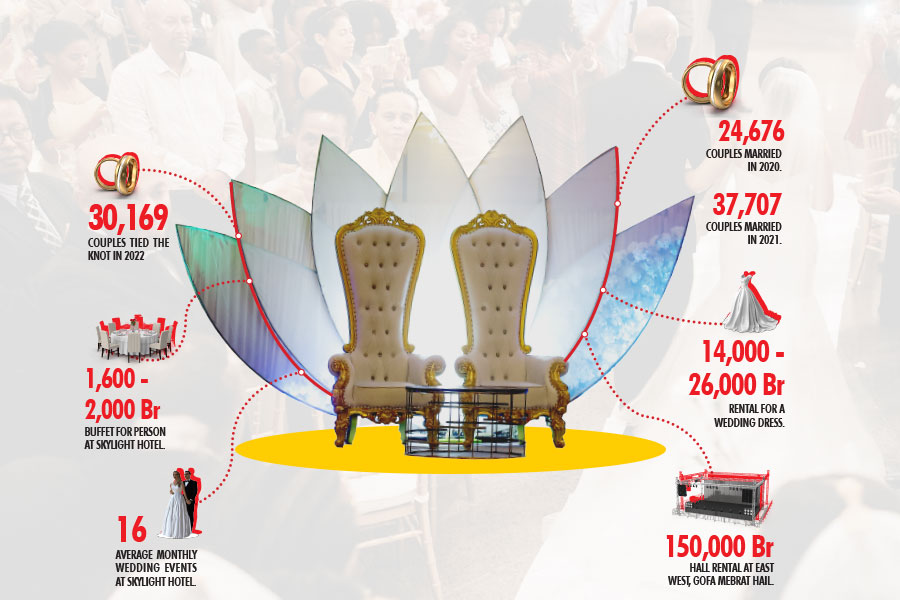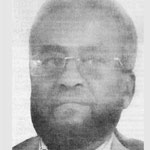
Sunday with Eden | Nov 21,2018
May 16 , 2020
By Christian Tesfaye
This month has been attended by developments that point to an escalation of antagonism in the political space.
We saw this as a number of opposition parties came out to reject the options presented by the government for extending the time in office of lawmakers past what is stipulated constitutionally. They claimed that the Constitution has no answers on what happens in the event that an election cannot be held and argued that they should have as much a share in governing as the current lawmakers come September.
In effect, they argued that they should be put in charge of the army, the police, the bureaucracy and tax administration, among other things, in, essentially, a power-sharing deal with Prime Minister Abiy Ahmed (PhD). They promised that this is not an effort to grab power but an opportunity for creating a grand bargain.
After the Derg, a supposedly transitional military government, and the four-year-long interim government in the early 1990s, the opposition parties believed that the third time would be the charm and the output would be legitimate.
The Prime Minister, on the otherhand, gave a televised statement recently to dissuade any notions of a transitional government. He rightly argued that there is a constitutional way out of the current conundrum. Unfortunately, he seemed to believe that this political and constitutional problem could only be addressed legally. He failed to stress that, without the opposition on board, it may mean very little in the eyes of the public, regardless of the details of the plan.
For a government that will be getting to extend its time in office, it should have been more humble. Indeed, the circumstances justify what the lawmakers and the administration are doing, but as representatives that would add perhaps a year to their time in office, they should have offered to bring in the opposition at least as an organised consulting body.
Instead, the opposition and the government find themselves on the opposite spectrum of the same political space – a cliché in Ethiopian political history. What is more daunting is the militant tone of rhetoric that is being employed. It is without a doubt symptomatic of Ethiopia’s politics, but it is no less astounding to see it in action time after time.
The political discourse, which had tapered off for a few months as COVID-19 took the attention away in almost every bit of public life, is back in its full, ugly form.
The politicians, as we can see from the statements and interviews they give out, are once again angry and deterministic. If it is not their way, they are then sure that it will end in absolute chaos.
They have brought back the militancy in their advocacy. This is the only way they know how to engage. They understand that there is no currency, not even attention, to be gained from being sober-minded. Sensibility is for losers they seem to be saying. They are here to win, and they will do whatever they can to get us to sympathise with their respective causes, at almost any expense.
If the only way they can get their point across is by making us become suspicious of our neighbours, they are not above doing it.
They say they are militant in their discourse because they care and feel so passionately. But this is, in fact, done without remorse for the public, without the concern that the scariest thing of all is their constant rhetoric of war.
They are not trying to engage or make a point. They are trying to frighten one another into submission. This is what has become of political discourse in Ethiopia over almost half a century of exercise.
There is an academic discussion taking place, but what the masses are exposed to is what is on the surface, the mainstream expression of political views. All one could get from the latter is a heavy dose of cynicism, a simplistic overview of history and a misunderstanding of political theory.
There is, for the most part, nothing new here. What we need as a country is a reinvention of our politics and a new generation of politicians that are not informed by the old, and largely male, remnants of the student movement of the late 1960s and early 1970s. We need a new breed of politicians who are less idealistic but also far less cynical about the possibility of a progressive and ordered society.
This, I admit, is a lot to ask for.
PUBLISHED ON
May 16,2020 [ VOL
21 , NO
1046]


Sunday with Eden | Nov 21,2018

Sunday with Eden | Jan 25,2020

My Opinion | Mar 19,2022

Fineline | Dec 14,2019

Fortune News | Jan 21,2023

Sunday with Eden | May 27,2023

Life Matters | Dec 24,2022

Verbatim | Apr 20,2019

Viewpoints | Sep 06,2020

Commentaries | Jan 03,2021

My Opinion | 132105 Views | Aug 14,2021

My Opinion | 128507 Views | Aug 21,2021

My Opinion | 126435 Views | Sep 10,2021

My Opinion | 124046 Views | Aug 07,2021





Dec 22 , 2024 . By TIZITA SHEWAFERAW
Charged with transforming colossal state-owned enterprises into modern and competitiv...

Aug 18 , 2024 . By AKSAH ITALO
Although predictable Yonas Zerihun's job in the ride-hailing service is not immune to...

Jul 28 , 2024 . By TIZITA SHEWAFERAW
Unhabitual, perhaps too many, Samuel Gebreyohannes, 38, used to occasionally enjoy a couple of beers at breakfast. However, he recently swit...

Jul 13 , 2024 . By AKSAH ITALO
Investors who rely on tractors, trucks, and field vehicles for commuting, transporting commodities, and f...

Jul 12 , 2025
Political leaders and their policy advisors often promise great leaps forward, yet th...

Jul 5 , 2025
Six years ago, Ethiopia was the darling of international liberal commentators. A year...

Jun 28 , 2025
Meseret Damtie, the assertive auditor general, has never been shy about naming names...

Jun 21 , 2025
A well-worn adage says, “Budget is not destiny, but it is direction.” Examining t...

Jul 13 , 2025 . By YITBAREK GETACHEW
The Addis Abeba City Revenue Bureau has introduced a new directive set to reshape how...

Jul 13 , 2025 . By BEZAWIT HULUAGER
Addis Abeba has approved a record 350 billion Br budget for the 2025/26 fiscal year,...

Jul 13 , 2025 . By RUTH BERHANU
The Addis Abeba Revenue Bureau has scrapped a value-added tax (VAT) on unprocessed ve...

Jul 13 , 2025 . By NAHOM AYELE
Federal lawmakers have finally brought closure to a protracted and contentious tax de...